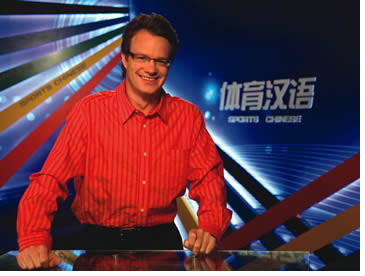For years now I’ve hosted a program on CCTV International, the English-language service of China’s state television broadcaster. Designed as a 15-minute Chinese language lesson for foreigners, the program has a healthy following. I’m just not sure it’s always for the right reasons.
The latest series, Sports Chinese, was launched during the lead-up to the Beijing Olympics. The intention was to help prepare foreign visitors by teaching sports-related vocabulary in Chinese. Deputy Director Wang is in charge. He speaks fairly good English, but I don’t think he really understands our target audience. We’re almost a week into production before he shows up on set, and he doesn’t like what he sees.
“This program is for foreigners, so you have to start from the basics,” he says. “Like, explaining Chinese doesn’t have an alphabet. Chinese characters are square-shaped ideograms. And there are different tones.” “But,” I explain, “these dialogues were written at an advanced level. By definition, our target audience must be people who have studied Chinese for some time and know something about China already. We shouldn’t underestimate them.”
Wang shakes his head in disgust. He’s lived abroad. He knows how ignorant foreigners are. “You can’t assume viewers are like you, having lived in China so long.”
“You can’t ask me to teach such advanced material if I have to start by teaching basics like the four tones,” I exclaim.
“I don’t think it’s so advanced,” says Wang. “Look at Lesson 1: ‘Hello. My name is Mike. I am an American.’”
I counter with a different example that shows, if anything, the script is overcomplicated: “Look at this sentence from Lesson 19: ‘Diving positions can be classified as straight, pike, tuck and free (during somersaults and rotations) respectively.’”
My co-workers are all looking at their feet and shuffling uncomfortably. Confucius preached the value of knowing your place in society, and publicly disagreeing with authority figures is not encouraged in Chinese culture. I speak out because, as the only non-Chinese production member, I am the only one who knows what it’s like to learn Chinese as a second language.
Step by step, the program moves further from its original intent. The main character, Mike, is an American sports reporter. However, he sounds more like a Chinese university student, always treating his teacher with great deference and talking about pulling an all-nighter to finish his latest article. (The scriptwriter is, in fact, a Chinese university student.) Someone in post-production decides to add English subtitles on the dialogues rather than romanized Chinese phonetics – fine for TV drama but not for a Chinese language lesson. As onscreen host, my work largely becomes damage control. I do what I can to help viewers survive the 15-minute lesson and take something useful from it.
The unacknowledged truth is the vast majority of our viewers are, in fact, Chinese students learning English. They don’t need to learn the dialogues; they just want to watch how I explain them in English. Across China I meet many people who tell me they enjoy my English teaching program, seemingly unaware that the program is called Sports Chinese.
My work is almost exclusively aimed at a Chinese audience. So, in a backwards way, this program has largely ended up with that same viewership. That’s not bad for me, but it does highlight a common problem in cross-cultural communication. Despite best efforts, each side of the cultural divide ends up spending more time talking to themselves.
Mark Rowswell (BA, Chinese Studies, 1988 UC) is known as “Dashan” by hundreds of millions of television viewers in China for his 20-year career as a performer and TV host.
Recent Posts
U of T’s 197th Birthday Quiz
Test your knowledge of all things U of T in honour of the university’s 197th anniversary on March 15!
Are Cold Plunges Good for You?
Research suggests they are, in three ways
Work Has Changed. So Have the Qualities of Good Leadership
Rapid shifts in everything from technology to employee expectations are pressuring leaders to constantly adapt





